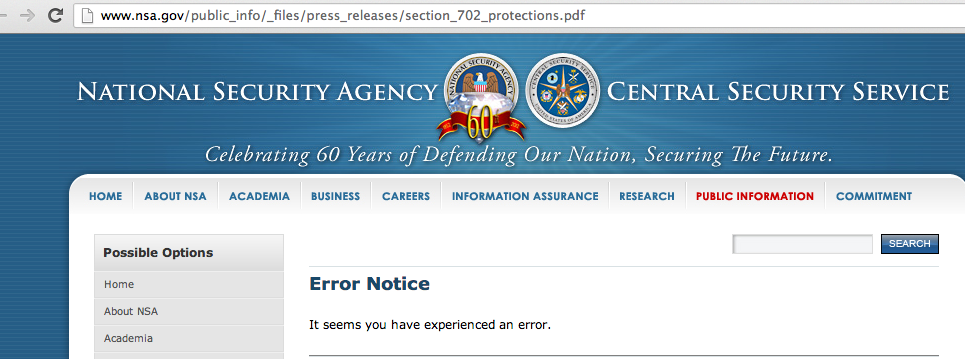James Clapper’s Double Super Secret Correction
 If the Director of National Intelligence corrects a lie but nobody hears it, does it make a sound?
If the Director of National Intelligence corrects a lie but nobody hears it, does it make a sound?
Greg Miller returns focus to James Clapper and Keith Alexander and President Obama’s lies that underscore why, at least for some of his leaks, Edward Snowden must count as a whistleblower. He reveals two new details about why Clapper is not headed for prison.
First, Clapper claims his staffers acknowledged to Wyden (presumably not in writing) his error after the Senator demanded a correction.
Sen. Ron Wyden (D-Ore.), who had asked Clapper the question about information collection on Americans, said in a recent statement that the director had failed to clarify the remark promptly despite being asked to do so. Clapper disputed that in his note to the committee, saying his “staff acknowledged the error to Senator Wyden’s staff soon after the hearing.”
And then, more than two weeks after Snowden proved Clapper to be a liar (and 10 days after Wyden called for hearings for the Intelligence Committee to correct their disinformation), Clapper sent the Senate Intelligence Committee a letter apologizing for his “clearly erroneous” comment.
Acknowledging the “heated controversy” over his remark, Clapper sent a letter to the Senate Intelligence Committee on June 21 saying that he had misunderstood the question he had been asked.
“I have thought long and hard to re-create what went through my mind at the time,” Clapper said in the previously undisclosed letter. “My response was clearly erroneous — for which I apologize.” [my emphasis]
Miller also reveals that Clapper presented yet another explanation for why his lie wasn’t really a lie.
He made a new attempt to explain the exchange in his June 21 correspondence, which included a hand-written note to Wyden saying that an attached letter was addressed to the committee chairman but that he “wanted [Wyden] to see this first.”
Clapper said he thought Wyden was referring to NSA surveillance of e-mail traffic involving overseas targets, not the separate program in which the agency is authorized to collect records of Americans’ phone calls that include the numbers and duration of calls but not individuals’ names or the contents of their calls.
Referring to his appearances before Congress over several decades, Clapper concluded by saying that “mistakes will happen, and when I make one, I correct it.”
Note, this particular lie retreats to Administration claims that they no longer collect Internet metadata, at least no via Section 702 collection, at least as far as they’lll tell us.
Of course, that’s only been true (if it is in fact true) since 2011, for what that’s worth.
One thing Miller is missing in this otherwise laudable article is one more detail from Wyden: that he gave Clapper notice he was going to ask the question.
Clapper got the question for the test before taking it, and he still — he says — misunderstood it.
But of course that’s not what happened. The way Clapper has made false statements in public and then “acknowledged errors” in secret is all part of the game by which Clapper mostly sort of tells the truth to Congress, but continues to lie to the American people.
In other news, it has now been almost a week since, caught in another lie, the NSA took down their “Section 702 Protections” document, without replacing them with an accurate description of what protections, if any, Americans have under Section 702.
Perhaps NSA has finally decided to start telling the truth?